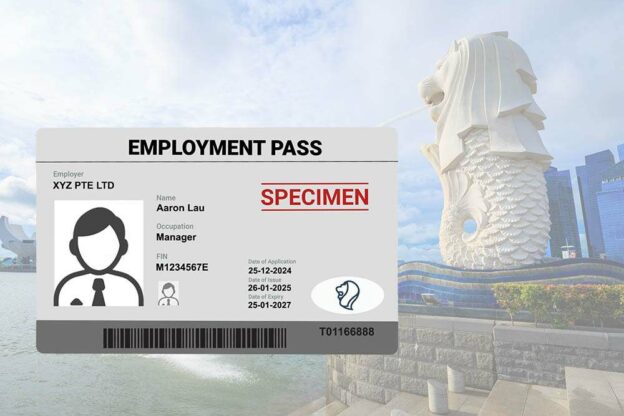For foreigners who wish to work in Singapore, understanding the country’s work pass system is essential. The Ministry of Manpower (MOM) regulates employment for non-citizens through various passes, each designed for different skill levels, industries, and employment needs.
Among these, the Employment Pass (EP) is one of the most well-known, but there are also other work passes that cater to different categories of workers.
Contents
Why Work Passes Matter
-
Legal Requirement: Foreigners cannot work in Singapore without a valid pass.
-
Regulated Market: Ensures fair competition and protection for both locals and expatriates.
-
Employer Responsibility: Companies must apply for and maintain passes on behalf of employees.
Main Types of Work Passes in Singapore
1. Employment Pass (EP)
Who It’s For: Professionals, managers, executives, and specialists.
Eligibility Criteria:
-
Job offer from a Singapore-based employer.
-
Recognised qualifications and relevant experience.
-
Meets the minimum qualifying salary (higher for experienced professionals).
Benefits:
-
Allows foreign professionals to live and work in Singapore.
-
Renewable as long as employment continues.
-
Dependents may join through Dependant’s Pass or Long-Term Visit Pass.
2. S Pass
Who It’s For: Mid-skilled workers such as technicians and supervisors.
Eligibility Criteria:
-
Meets salary and qualification requirements.
-
Quota restrictions apply to employers (companies can hire only a limited number of S Pass holders).
Benefits:
-
Renewable, subject to quota and levy conditions.
-
Dependents may be eligible if salary criteria are met.
3. Work Permit
Who It’s For: Semi-skilled and unskilled foreign workers in industries like construction, manufacturing, shipyard, and domestic work.
Eligibility Criteria:
-
No formal academic qualifications required.
-
Employer must provide housing and medical insurance.
Benefits:
-
Valid for up to two years, tied to the employer.
-
Dependents are generally not allowed.
4. Other Passes
-
Personalised Employment Pass (PEP): For high-earning professionals with greater job flexibility.
-
EntrePass: For entrepreneurs starting and operating a business in Singapore.
-
Training Employment Pass: For foreigners undergoing professional training.
Key Considerations for Foreign Professionals
-
Employer Sponsorship: All passes (except certain cases like PEP) require employer application.
-
Minimum Salary Requirements: Regularly updated to ensure competitiveness and alignment with local wages.
-
Validity and Renewal: Passes are typically valid for one to two years and renewable upon meeting conditions.
-
Quota and Levy: Applies mainly to S Pass and Work Permit holders, not Employment Pass holders.
-
Family Sponsorship: Higher-tier passes like EP and PEP allow dependents to join.
Opportunities for Pass Holders
-
Access to Singapore’s dynamic job market.
-
Potential career growth in multinational companies.
-
Networking opportunities in a global business hub.
Challenges for Applicants
-
Strict Eligibility: Not all job offers qualify for work passes.
-
Competition with Local Talent: Employers must justify hiring foreigners.
-
Changing Policies: MOM reviews and adjusts requirements regularly.
-
Application Process: Requires careful documentation and employer compliance.
FAQs
What is the difference between Employment Pass and S Pass?
The Employment Pass is for higher-skilled professionals, while the S Pass is for mid-skilled workers.
Can I apply for a work pass on my own?
Generally no. Employers in Singapore must submit applications on behalf of candidates.
How long is an Employment Pass valid?
Usually one to two years, with the possibility of renewal.
Can my family join me if I hold an Employment Pass?
Yes. Dependents can apply for a Dependant’s Pass or Long-Term Visit Pass, subject to conditions.
Is it easy to get a work pass in Singapore?
It depends on qualifications, salary, industry demand, and government regulations.
